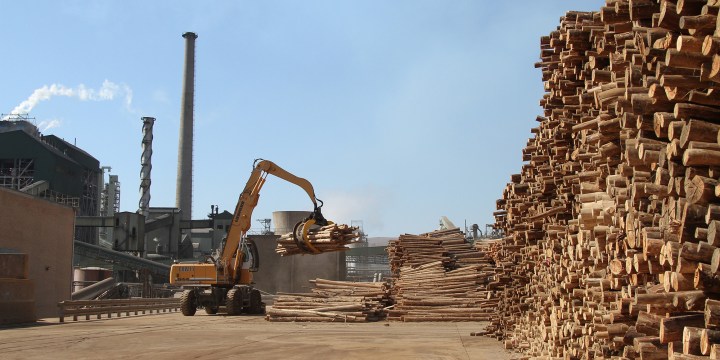BUSINESS MAVERICK 168
State and forestry industry lock horns over water laws in wake of pulp sector’s plantation plans

As the forest industry converts from pine to the thirstier eucalyptus, the government has stepped in to curb plantation size, saying that every drop counts – especially in a water-scarce country like SA.
First published in the Daily Maverick 168 weekly newspaper.
The government and the forestry industry have locked horns in a court case that may have far-reaching implications for South Africa’s water laws and “threaten the entire basis of water-use allocations” to the forestry industry and other major water users.
In simple terms, the dispute involves the large volumes of water sucked up by different plantation tree species and the timber industry’s recent drive to convert more of its plantations from pine trees to gum trees because of changing commercial demand.
Swapping one species of plantation tree for another may not seem like a big deal, but in a water-scarce country like South Africa, water regulators insist that every drop needs to be counted and allocated carefully.
The forestry industry claims that the water-use impacts of swapping tree species are largely insignificant or legally protected, but the government and senior water experts note that gum (eucalyptus) trees can use up to 45% more water than pine trees in some areas, though in many cases they use about 25% more water.
Regulators have demanded that foresters reduce the total area of new gum trees planted to compensate for the extra water use in a country ranked as the 30th-driest in the world.
The court battle, initiated by Forestry South Africa (FSA) nearly two years ago, came before Acting Judge Selwyn Hockey in the Western Cape High Court again last month after several preliminary legal skirmishes. Judgment has now been reserved.
The case has also highlighted the decades-old conflict between commercial timber growers, government regulators and other downstream water users over how to regulate water use by an industry that consumes large volumes of water in many of South Africa’s richest mountain water-catchment areas. Unlike the water extracted from rivers and boreholes by irrigation farmers, the water used by individual trees and plantations cannot be metered or measured precisely. As a result, forestry experts and hydrologists have developed a range of advanced theoretical tools and computer models to calculate the water volumes to regulate this use.
FSA has challenged the application of these calculation models, arguing that they are not suitable for measuring actual water use at the micro-scale of individual timber farms. FSA executive director Michael Peter argued in court papers that the government’s expert-developed calculations of commercial forestry water use were based on large-scale catchments and did not take into consideration factors such as differing soil types, soil depths, rainfall, temperature or altitude at the farm scale.
Therefore, FSA argued, these water use estimates were only suitable for “broad, preliminary national or regional planning” and were not appropriate for smaller-scale decision-making.
FSA also contended that the use of these models was unreasonable because they were based on a limited range of tree types and tree ages.
Peter claimed that if timber companies were compelled to reduce the size of plantations when switching from pine to gum, this could have a “profound impact” on FSA members and cause “numerous indirect job losses”.
His association said the Department of Water and Sanitation published draft regulations in 2015 to control tree genus swaps, but these were suspended after FSA consultant Dr Mark Gush allegedly demonstrated that the department had made a “fatal error” in the application of its mathematical water-use calculations for tree species conversions.
The department argues that the regulation and conservation of water cannot be held to ransom by the commercial imperatives of the forestry industry.
But two Department of Water and Sanitation acting directors-general, Trevor Balzer and Mbulelo Tshangana, submitted affidavits denying that there was a fatal error. The evidence of the two senior officials was supported by Prof Graham Jewitt, one of South Africa’s most noted forest hydrology experts.
Jewitt, the former head of the Centre for Water Resources Research at the University of KwaZulu-Natal, now heads the Department of Water Resources and Ecosystems at the IHE Delft Institute for Water Education in the Netherlands, the largest international graduate water education facility in the world.
Balzer and Tshangana also noted that Gush subsequently reconsidered and “disavowed” some of the central contentions of the consultancy report he prepared for FSA in 2016, and Jewitt had also characterised FSA’s use of some of Gush’s conclusions as being founded on “mathematical trickery”.
Tshangana said no reliance could be placed on Gush’s report and it was clear that FSA has decided not to seek a supporting affidavit from him “purely on the basis of the fact that he would not support his [previous] allegations”.
The department argues that the regulation and conservation of water cannot be held to ransom by the commercial imperatives of the forestry industry.
In its 2016 sustainability report, Sappi, the pulp and paper group, noted an increased demand in China, India and Indonesia for timber-based clothing and textiles rather than cotton products and the group was therefore expanding its eucalyptus-based dissolving wood-pulp capacity at the Ngodwana and Saiccor mills by 40,000 and 50,000 tons per annum respectively. FSA had also advised members that they could switch from pine to gum planting without reducing planted areas when doing so.
But Tshangana told the court: “One of the primary functions of the Department is to regulate water use (including afforestation)… If the 2009 Jewitt Report is not to be used in the licensing of commercial forestry, and if genus exchange was to take place unregulated, a person who had a licence or permit to only plant pine trees would have increased his water use by up to 45%.”
The implication of this was that in catchments that are almost fully allocated (where there was no more water for allocation), there would be significant negative impacts on the reserve and other downstream industries and water users – especially during droughts.
“This will result in the availability of water for human consumption, animals, the ecosystem and other downstream users being negatively affected… For these reasons the [government] requires a person who wishes to change genus to apply to the Department. Where the genus exchange is from a lower water-using genus [pine] to a higher water-using genus [gum], the planted area would have to be reduced so as to stay within the lawfully allocated water-use volume.”
Tshangana said the water-use calculation methods in the Jewitt report were currently the best available tool – and, in any event, provided conservative estimates and did not require a blanket 30% or 45% reduction in planted areas.
“I do not dispute the commercial motivations for the genus exchange from pine trees to eucalyptus trees. What is disputed is the proposition that such genus exchange must take place unregulated and to the detriment of the ecological sustainability of the water resource… [T]he economic benefit of an activity alone can, therefore, not be used to override the ecological impacts.”
His colleague, Trevor Balzer, noted that FSA had not proposed any better or viable alternatives, also cautioning Judge Hockey that the industry was seeking to change the established history of water allocations in South Africa.
“If FSA’s argument is to be accepted, the entire basis for the allocation of water-use licences under the 1998 Water Act will be under threat.”
Balzer also noted that FSA and its members had previously been happy to accept the water-use modelling tools developed by scientific experts and it was therefore “inexplicable, illogical and absurd” for them to now argue that these tools should not be used. DM168
This story first appeared in our weekly Daily Maverick 168 newspaper which is available for free to Pick n Pay Smart Shoppers at these Pick n Pay stores.





















 Become an Insider
Become an Insider
Comments - Please login in order to comment.